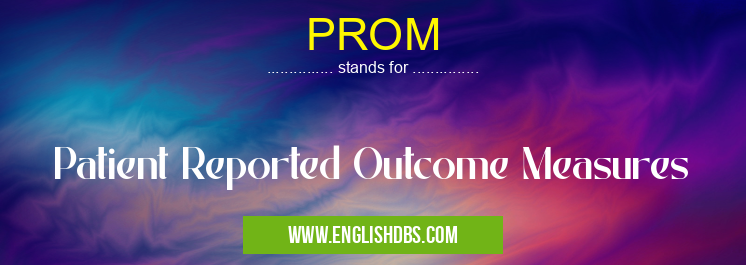What does PROM mean in RESEARCH
Patient Reported Outcome Measures (PROMs) are instruments that capture a patient's subjective experience and perspectives on their health and well-being. These measures are used in healthcare settings to assess treatment effectiveness, track patient progress, and inform clinical decision-making.

PROM meaning in Research in Academic & Science
PROM mostly used in an acronym Research in Category Academic & Science that means Patient Reported Outcome Measures
Shorthand: PROM,
Full Form: Patient Reported Outcome Measures
For more information of "Patient Reported Outcome Measures", see the section below.
What does PROM Stand for?
- Patient
- Reported
- Outcome
- Measures
Meaning of PROM in SCIENCE
In scientific research, PROMs are used to quantify the impact of interventions on patient outcomes. They provide valuable information about patients' perspectives and experiences, which may not be captured by objective clinical measures. PROMs are often used in clinical trials and observational studies to evaluate the effectiveness of new treatments, therapies, and healthcare interventions.
Key Characteristics of PROMs
- Patient-centered: PROMs capture the patient's own perspective on their health and well-being.
- Multidimensional: They assess various aspects of a patient's experience, such as physical function, mental health, and social well-being.
- Standardized: PROMs are standardized questionnaires or instruments that ensure consistency in data collection and comparison across patients.
- Validated: PROMs have been validated for accuracy and reliability in measuring patient outcomes.
Types of PROMs
There are a wide variety of PROMs available, each designed to assess specific aspects of a patient's health experience. Common types of PROMs include:
- Generic: General measures that assess overall health and well-being, such as the Short Form Health Survey (SF-36) and the Patient-Reported Outcomes Measurement Information System (PROMIS).
- Condition-specific: Measures that focus on a particular health condition, such as the Western Ontario and McMaster Universities Osteoarthritis Index (WOMAC) for osteoarthritis.
- Symptom-specific: Measures that assess specific symptoms, such as the Beck Depression Inventory (BDI) for depression.
Benefits of Using PROMs
- Improved patient-provider communication: PROMs facilitate open and informed discussions between patients and their healthcare providers.
- Enhanced treatment decision-making: By capturing patient perspectives, PROMs inform clinical decision-making and help providers tailor treatments to individual patient needs.
- Monitoring patient progress: PROMs enable healthcare providers to track patient progress over time and identify areas where improvements can be made.
- Evaluating treatment effectiveness: PROMs provide objective data on the impact of treatments and interventions, allowing healthcare providers to assess their effectiveness.
Essential Questions and Answers on Patient Reported Outcome Measures in "SCIENCE»RESEARCH"
What are Patient Reported Outcome Measures (PROMs)?
Patient Reported Outcome Measures (PROMs) are standardized surveys that gather patients' own perspectives on their health and well-being. They capture information about a patient's symptoms, functioning, and quality of life.
Why are PROMs important?
PROMs provide valuable insights into how patients experience their health condition and treatment. They can help:
- Track patient progress and outcomes over time
- Identify areas where improvements can be made
- Inform clinical decision-making
- Evaluate the effectiveness of interventions
What types of information do PROMs gather?
PROMs can collect a wide range of information, including:
- Symptoms (e.g., pain, fatigue, stiffness)
- Functional abilities (e.g., mobility, self-care)
- Emotional and mental well-being (e.g., anxiety, depression)
- Health-related quality of life (e.g., satisfaction with life, role limitations)
How are PROMs used in healthcare?
PROMs are used in various healthcare settings, including:
- Clinical practice: To monitor patient progress, adjust treatment plans, and evaluate outcomes
- Research: To study the effectiveness of interventions and identify areas for improvement
- Healthcare policy: To inform decision-making and allocate resources
Are PROMs reliable and valid?
Well-developed PROMs are carefully designed and validated to ensure reliability and validity. Reliability refers to the consistency of the measures, while validity refers to the accuracy with which they measure what they claim to measure.
How can patients participate in PROM collection?
Patients can participate in PROM collection by completing surveys or questionnaires. These may be administered in person, by mail, or electronically. It is important to provide honest and accurate responses to ensure the validity and reliability of the data.
Final Words: PROMs are essential tools in healthcare research and practice. They provide valuable insights into the patient's perspective, enhance clinical decision-making, and improve patient outcomes. By incorporating PROMs into healthcare settings, we can ensure that patient voices are heard and that their experiences are central to the delivery of high-quality care.
PROM also stands for: |
|
| All stands for PROM |
